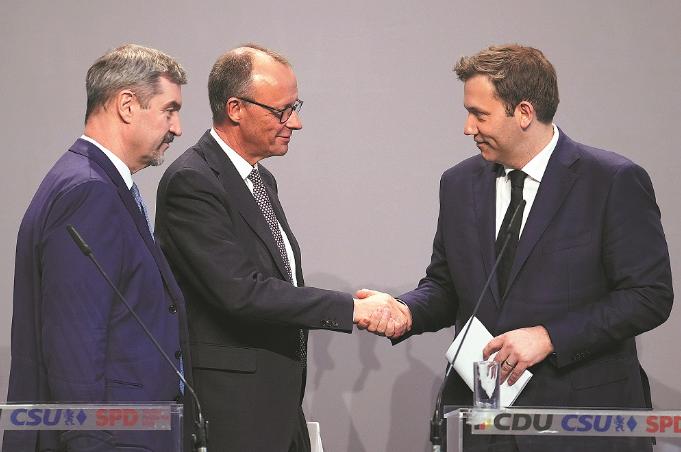Chancellor-in-waiting promises to spur growth as survey shows far right gains
Germany’s Chancellor-in-waiting Friedrich Merz (center) shakes hands in Berlin on Wednesday with leaders of the Social Democratic Party and Christian Social Union Party, after reaching an agreement for a new government. EBRAHIM NOROOZI/AP
German conservatives under Friedrich Merz clinched a coalition deal on Wednesday, aiming to revive growth in Europe’s largest economy just as global uncertainties threaten recession.
The conservative Christian Democratic Union/Christian Social Union, or CDU/CSU, after having emerged as the largest party in February’s parliamentary election, has now secured a coalition deal with the center-left Social Democrats, or SPD.
Talks between the party of chancellor-in-waiting Merz and the SPD, which came third in the election behind the far-right Alternative for Germany, or AfD, has been going on for a while. Now an extra element of urgency has been injected by the global economic turmoil caused by the United States’ tariff policy.
As he announced the deal, Merz said economy, defense and migration, a particularly contentious election issue, would all be on his agenda in his bid to reform the country and make it more stable.
“Europe can rely on Germany,” he added, pledging “a strong plan to bring our country to the forefront again … Germany is getting a government that is capable of action and (is) strong”.
Merz also had a message specifically for the White House, delivered in English. “The key message to (United States President) Donald Trump is Germany is back on track”, he said.
Policies the coalition intends to pursue, Merz said, include lowering energy prices, reducing taxes, increasing support for the electric vehicle industry, and reforming the constitutionally enshrined government spending limits known as the debt brake — which critics said has hampered growth in Europe’s biggest economy.
With the AfD breathing down its neck, the coalition signaled a tougher stance on migration, planning to turn away asylum-seekers at Germany’s borders and scrapping fast-tracked naturalization.
It also announced a voluntary military service and the creation of a national security council, as well as moves to speed up defense procurement and backing Ukraine’s bid to join the NATO alliance.
The swift conclusion of the talks, a process that has in past years dragged on for months in Germany, is the result of “extraordinary external pressure”, said political scientist Wolfgang Schroeder of Kassel University.
“The pressure is coming from Trump, the pressure is coming from the AfD, the pressure is coming from (Merz’s) own ranks,” he told news channel NTV.
Record support
A new poll published on Wednesday shows the AfD as the most popular party for the first time, scoring 25 percent, as opposed to Merz’s party with 24 percent.
Renate Koecher, head of the Allensbach Institute, said the rise of the AfD had been fueled by Germany’s political paralysis at a time of acute global and domestic crises.
“Problems are growing, but at the same time we have no government capable of acting,” Koecher told the Rheinische Post newspaper.
“The economy is facing increasing difficulties and decisions are being made in the US that Europe, with Germany in a leading role, should be able to respond to quickly,” she said.
“And in this situation, we have a power vacuum. This fuels the unease among the population.”
In response to the latest polling figures, AfD Co-chair Alice Weidel said: “There’s no way around the AfD anymore.”
Writing on social media platform X, she said it was time for a “true, bourgeois political shift”, as German voters “don’t want another left-wing government in which the CDU/CSU lets the SPD and Greens dictate their policies”.
The SPD and the Green Party were two of the coalition partners in the previous government that fell apart toward the end of last year, bringing forward this year’s scheduled parliamentary election, from fall to spring.
Agencies contributed to this story.
